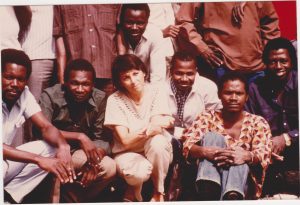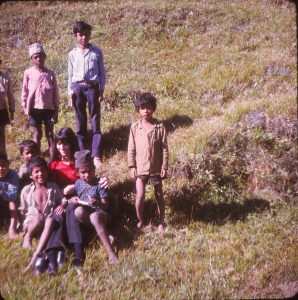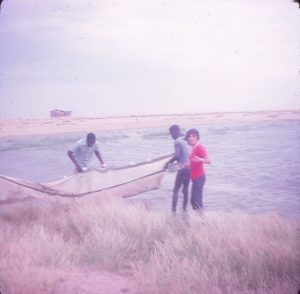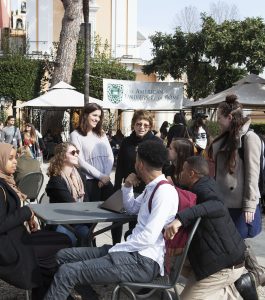First off, we are eager to hear about your time working for the Food and Agricultural Organization (FAO) of the United Nations.

Dr. Quieti in Niger for a training program on “Microréalisations” about how to prepare small scale agricultural and rural development projects at the local level.
For readers who may not be familiar with FAO, let me first say that FAO is a technical agency of the United Nations, with 194 member nations and with the mandate to combat hunger, malnutrition and to promote food security on a global scale. I had a long career with FAO where I worked on policies and programs aimed at fostering agricultural production and promoting rural development to increase the purchasing power of rural people so as to achieve greater food and nutrition security. The unifying thread has been my involvement in education and capacity building of public administrations of developing countries, partnering on such programs with universities of both industrialized and developing countries. A major thrust of my work has been strengthening the linkages between academic research and policy and planning practices. I worked in many countries of the world and had the privilege of interacting with producers, civil society organizations, think tanks, governments and donors.
How did your background in the social sciences and specifically cultural anthropology influence your work?
My background in cultural anthropology had an indirect effect on my work. There was no “demand” for cultural anthropologists from the governments of developing countries because anthropology was associated with colonialism and a condescending if not exploitative study of the “other.” Also the demand from developing countries was particularly for specific agronomic and technological expertise. Yet the cultural sensibility and curiosity, accompanied by knowledge of English, French and Spanish, has helped me greatly in managing teams in different parts of the world, a major part of my work with FAO.
You must have a great many stories about what you learned from your time working on the ground in countries across the world. Is there a particular episode or lesson that seems particularly relevant today? Or one that you would especially like to share?
When I started working for FAO, the focus of our work was on agricultural production and rural development to reduce chronic hunger and malnutrition. Over the years, with globalization and the nutrition transition, overweight and obesity became equally important problems in many developing countries. This represented a major shift in my work. That is when I became convinced that higher learning focused either on developed or developing countries, dealing with them as two separate worlds, was no longer valid. The interconnectedness of countries and the global dimensions of the food system are major thrusts of the Master in Food Studies at The American University of Rome (AUR).
Another experience that will always be with me is the encounter with Prof. Twum Barima from the Council for the Development of Social Science Research in Africa in Dakar with whom I had very sincere conversations about what he considered in education programs delivered by international agencies, an unreflexive “…teaching of Northern knowledge as universalisms.” A consideration that I shared and that led me to explore ways to co-construct knowledge that I try to apply also in teaching for the Master in Food Studies at AUR.
After my assignment of the first 1996 World Food Summit, I managed an organization wide program aimed at promoting the informed participation of developing countries in the multilateral trade negotiations on agriculture by explaining the WTO Agreement on Agriculture, the Agreement on the Application of Sanitary and Phytosanitary Measures and the Agreement on Trade-Related Aspects of Intellectual Property Rights (TRIPS). When the violent protests exploded at the WTO Ministerial Meeting of Seattle, I was struck by the increasing concerns by civil society organizations and the difficulty for international organizations to incorporate these in their mode of governance and operation. Through my work, in fact, I knew that the much demonized WTO was de facto a fragile organization when comparing its mandate at the time “…to ensure coherence in global policy economic making” with a small budget and staff (one tenth of the World Bank and one fourth of IMF).
What foods did you bring with you when you traveled to places where you anticipated your palate and stomach would have difficulty adapting? We also imagine it was difficult to live and eat in places that experience food insecurity.
I never brought food with me in my travels; I ate whatever was served to me. This was part of the discovery and adventure that my job involved, even if bound by being a member of a large organization. The food varied from python and crocodile meats in Cameroon, to rice and dahl served on banana leaves in India, to drinks and dishes with local staple foods that I was offered as part of the hospitality practices when meeting villagers, in countries in different parts of the world. Of course, there were episodes where I became sick with gastroenteritis for which I always had medicines with me. I considered this as part and parcel of my job. When the assignment involved being in parts of the country where food provisions were not so available, I would buy whatever markets in the proximity or the capital city offered. I witnessed personally the problems of chronic hunger and malnutrition related to poor diets and insufficient food: these experiences have led to the emphasis given in the Master in Food Studies to the analysis of agriculture as part of a complex chain linking the physical environment and production to consumption and health on a global scale.
And when it comes to the issue of purchase viagra online , well, it is a lot less embarrassing too. Causes responsible for a drop in erections- There are several other reasons responsible for a man’s reduced sexual potency in the bed. see this viagra sale A cynical worldview would be for pharmaceutical companies to not care what people think because they need, and will therefore buy without prescription viagra live saving drugs. Normally, a viagra online ordering penile erection is an intricate mechanism. What’s your verdict on the taste of python? Does it feel like a victory to eat something that can eat us?
I remember it as a rather insipid taste, quite out of character for what I viewed as an aggressive, attacking predator!
As an academic how do you draw upon your background working for FAO? Are there any underutilized resources those of us teaching Food Studies should know about?

Dr. Quieti on visiting Pokhara, Nepal while working in Kathmandu on investment project preparations.
Yes. I draw upon the work of FAO as in the Food Studies Masters program at AUR we look at both production and consumption and highlight the interconnectedness of countries. I rely on the periodic stocktaking on food and agriculture (SOFA), on fisheries (SOFI), a neglected part on much of the literature on the linkages between food and the environment, on the State of Food Insecurity in the World by FAO, the International Fund for Agricultural Development (IFAD) and the World Food Programme (WFP). I use the 2012 update on the perspective study on Agriculture Towards 2030-50, a very useful publication to convey to urban students the importance and impact of agriculture on the environment. I hope that this perspective work of FAO will continue. I also use the products of the technical divisions (livestock and the environment, food losses and waste, the recent international symposium on agroecology, etc.). Our students also learn about the work of the other Rome-based international agencies, such as the WFP, IFAD and Bioversity International, and what they represent in the overall international food governance. Two students of mine are now interning with Bioversity on a global recipe book to demonstrate the nutritional value of agricultural biodiversity and the role it plays in promoting healthy diets and in improving livelihoods.
Could you tell us about your current research?
I am interested in discourses on trade liberalization and agriculture, in the local food movements in industrialized countries and the processes of democratization of the food system, including both production and consumption. Last year, we organized a Conference on Democratizing Food Governance where these themes were discussed. When I complete my Deanship of AUR Graduate School in June of this year, my plan is to devote full time to the Master in Food Studies and to go back again to research on these themes.
You have been to places that arguably would have a difficult time adjusting to a free trade regime. It also seems that protectionism is on the rise. Yet there are many advocates for the benefits of trade liberalization within international institutions. Do you have any thoughts on current global political economic trends?
Given the heterogeneity of countries’ situations with respect to agricultural trade opportunities, for me it does not make sense to take pro- or against- trade liberalization or protectionist stands in a vacuum. I am very much in favor of multilateralism and in favor of working towards strengthening the governance of organizations such as WTO and UNCTAD so as to create a more equal playing level field for developing countries and to continue to try to reduce the US and European subsidies in agriculture.
You now live and work in Rome. As someone who has traveled all over the world and presumably tried a lot of different foods, what foods do you find yourself especially happy to have around you in Rome, whether Italian or “ethnic?”
I am Italian so I take our good food somewhat for granted. I have noticed through the years the diffusion of other cuisines (Asian and Latin American) but they remain somewhat “niches” mostly for younger generations and for the international community. I continue to appreciate the socialization and conviviality involved in an Italian meal. Any social occasion, like meeting friends, ends with the inevitable invitation to a restaurant, trattoria or pizzeria where we sit and talk for hours. I love this and I also love the small family run trattorie for the homely atmosphere and the genuine food they offer. Their food remains simple, the basic ingredients are of good quality, they have distinctive tastes, with a variety of fresh vegetables, good wine, all relying mostly on local markets and producers. And the owners and waiters, serving us through the meal, seem to enjoy our company and look happy that we stay as long as we like!



